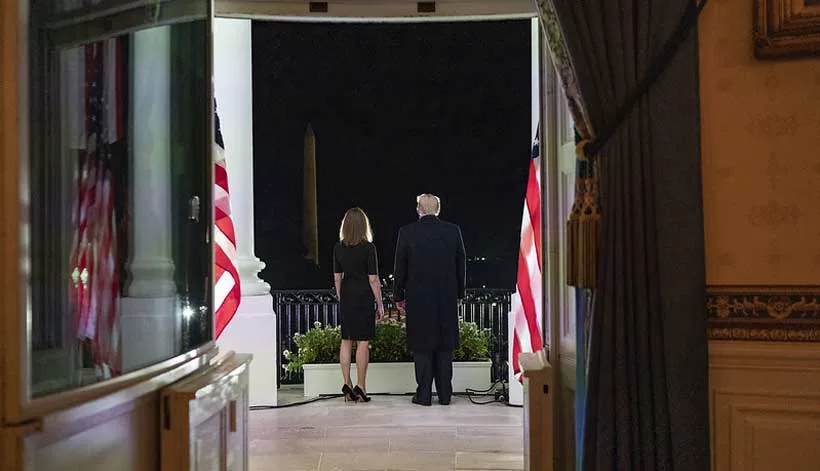The 2024 U.S. election sees former President Donald Trump as a prominent candidate, aiming for a potential return to the White House. If he wins, it would mark a momentous comeback as only the second president in U.S. history to serve non-consecutive terms. Trump’s platform is expected to strengthen his “America First” agenda, focusing on issues like immigration reform, economic protectionism, and reducing U.S. involvement in foreign conflicts. His policies would likely prioritize harsher immigration control, energy independence, and a continued focus on U.S.-China competition, affecting trade and geopolitical alliances globally. A Trump victory could shift U.S. foreign policy, mostly with allies and adversaries such as NATO partners, Russia, and China. His approach would potentially emphasize bilateral deals over multilateral agreements and prioritize transactional relationships. For countries like Pakistan, this shift might mean adapting to an American stance that is less involved in South Asian regional conflicts but focused on countering Chinese influence, affecting Pakistan’s economic and diplomatic balance.
As the presidential election week is approaching in US, questions loom over what a potential second term of president Donald trump, if elected will mean for Pak-US relations. While foreign policy is the epicenter in American electoral debates, the outcome has direct consequences for U.S. allies and partners worldwide. Pakistan, with its complex strategic relationship with the United States, would likely feel the impact of Trump’s re-election in areas such as trade, security, regional stability, and economic assistance. The Pak-US relations during the President Trump’s last tenure were faced many ups and down. During his previous term, Trump took a harsh stance on Pakistan, criticizing its role in counterterrorism efforts and temporarily suspended its military aid. However, by the end of his presidency, he had also initiated the historic peace process with the Afghan Taliban, relying on Pakistan as a key facilitator. If re-elected, Trump might seek to continue a realistic, transactional approach with Pakistan, focusing on issues of mutual interest like counterterrorism. However, there is a chance that under a tough-love policy, Trump could again pressure Pakistan to meet strict conditions, especially regarding cross-border militancy. While on economic front Trump’s second term may bring some more options for bilateral trade. Trump’s “America First” approach preferred reduced foreign aid spending, which could impact the level of economic assistance available to Pakistan. With Pakistan’s economy facing significant challenges, any reduction in U.S. aid could compound domestic economic concerns. On the other hand, Trump’s administration previously expressed interest in exploring trade partnerships to balance aid cuts, suggesting potential trade agreements that could benefit Pakistan’s exports. If re-elected, Trump may push for trade policies favorable to U.S. interests but could also provide opportunities for Pakistan’s textiles and goods.
One of the most important impact of Trump’s second term could be on regional security. Trump has constantly advocated for the US withdrawal from prolonged conflicts and its military engagement in other regions. This approach could lead to fewer U.S. involvement in South Asia, pushing regional powers to assert themselves more forcefully. For Pakistan, this could mean both opportunities and challenges particularly with India, as Trump sustained strong ties with the Modi administration. A Trump presidency could increase Pakistan’s balancing act between U.S. interests and its own strategic alliances, especially as it manages relations with India and China. Trump’s first term was marked by a hardline stance on counterterrorism, with policies that included withholding military aid over concerns of Pakistan’s counterterrorism efficacy. However, he did acknowledge Pakistan’s role in facilitating talks with the Taliban. In a second term, Trump might continue to prioritize direct U.S.-Pakistan military engagements but could make cooperation provisional on rigorous conditions, such as action against specific militant groups. This conditional approach may pressure Pakistan to adopt policies that align more closely with U.S. expectations, affecting its defense strategies. Under Trump’s “America First” policy, U.S.-China relations touched new lows, with intensifying trade and technology conflicts. If re-elected, Trump may continue his rigid approach against China, which could have direct implications for Pakistan given its strong economic and strategic ties with Beijing. Pakistan could face increased inspection for its participation in the China-Pakistan Economic Corridor (CPEC) as well as for its diplomatic alignment with China on key issues. Trump may compel Pakistan to distance itself from Chinese economic projects, creating a challenging balancing act for Islamabad. If Trump were to secure a second term, Pakistan would likely face both challenges and opportunities in steering its relationship with the United States. A Trump victory would require Islamabad to cautiously consider its strategic goals, balancing its partnerships with the U.S. and China while addressing regional security concerns. Pakistan’s leadership would need to approach the evolving geopolitical landscape with caution, as decisions made in Washington could have a lasting impact on its domestic and foreign policy agenda. The future trajectory of U.S.-Pakistan relations under another Trump administration would depend heavily on how effectively Pakistan manages these strategic dynamics.
To conclude, A potential re-election of Donald Trump in 2024 could have nuanced implications for Pakistan’s foreign policy, impacting its regional strategy, economic priorities, and strategic alliances. Pakistan’s foreign policy emphasizes balancing relations with major powers like the U.S. and China, maintaining regional stability, and securing economic development. Trump’s re-election could challenge this balance. In South Asia, Trump’s administration previously shifted focus towards India, aiming to counter China’s influence. Pakistan, a close ally of China, may face increased U.S. pressure to reassess its stance on China-Pakistan Economic Corridor (CPEC) projects and align closer with U.S. interests. This pressure could strain Pakistan’s ties with China, which has been a vital partner in economic and defense sectors, and place Pakistan in a difficult diplomatic position as it tries to maintain positive ties with both powers.
